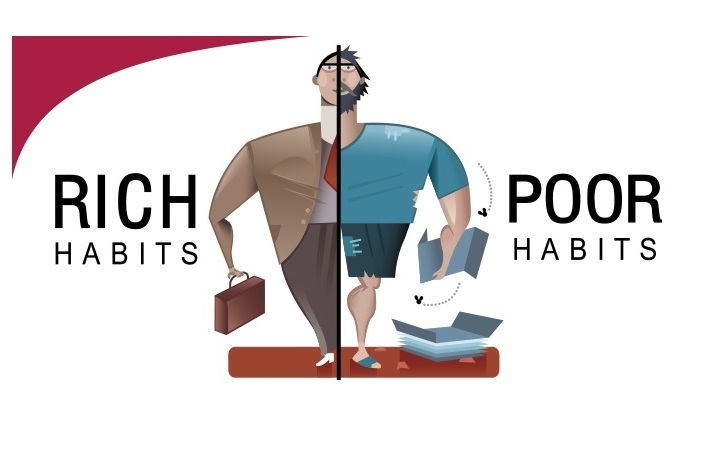
If you find value in these articles, please share them with your inner circle and encourage them to Sign Up for my Rich Habits Daily Tips/Articles. No one succeeds on their own. Thank You! TOM@RICHHABITS.NET
The rich get richer.
You’ve no doubt heard that soundbite many times.
But, is it true?
The short answer is no.
According to the Williams Group, a wealth consultancy group, 70% of wealthy families lose their wealth by the second generation, and a stunning 90% by the third.
Still, those raised in wealthy households have a huge advantage over those raised in poverty.
Advantages
- Better Education – Those raised in wealthy households generally live in wealthier neighborhoods. These neighborhoods typically have better school systems with better teachers and more educational resources.
- More Resources – The rich obviously have more resources. They can afford to hire tutors for their children. They can afford to fund ancillary costs associated with the clubs or organizations their children are able to participate in. They can afford to enroll their children in SAT preparation courses. They can afford to fund college education for their children.
- More Time – Many of the children raised in poor households are, at some point, called upon to help pull the cart – they must find work to help support the family. This limits how much time they have to do anything else. Those raised in wealthier households do not have this need. Thus, wealthy kids have more time to study, more time to participate in school clubs and more time to spend building long-lasting relationships with their wealthy friends. These long-lasting relationships pay dividends down the road. Finding a job is easier – just reach out to one of your childhood friends, and ask them to open a door for you.
- Formal Education – Wealthy kids often attend expensive private schools. These schools are more focused on preparing their students for college. As a result, almost 100% of graduates from private high schools attend college. Conversely, only about 16 percent of low-income students graduate college.
- Success Peer Pressure – Children raised in wealthy households are expected to go to college and sometimes graduate school. In the minds of their wealthy parents, this tees their kids up to find better, higher-paying jobs, upon graduation. In these wealthy enclaves, this becomes a shared expectation wherein everyone within these rich neighborhoods is on a similar path – the pursuit of a college and/or a graduate school education. This “Herd Doctrine” has a very powerful gravitational pull that directs the behavior of those inside the “rich neighborhood herd”.
But, growing up rich also comes at a cost. There are certain disadvantages to growing up rich that inhibit the pursuit and accumulation of wealth.
Disadvantages
- Less Willing to Take Risks – Those raised in wealthy households have a lot to lose. Thus, they are more risk averse than those raised in poverty, who have nothing to lose.
- Inferior Work Ethic – Comfort can lead to complacency. Those raised in a wealthy household do not have to work for their meals, their school supplies, their video games, their iPhones, etc. When you have no choice but to work in order to get the things others are given, you are forced to develop a hard work ethic. Because success requires a strong work ethic, if you lack it, success will be impossible.
- Fear of Failure – One of the downsides of failure, is that failing at something can put you in the poor house. When you grow up poor, you don’t fear poverty as much, because it is something you are familiar with and something you survived. Therefore, failure does not frighten you as much. Those raised in wealthy households, however, become accustomed to having the good things in life. Thus, fear of failure means losing what you have. That fear will hold you back from the pursuit of your dreams, because such pursuits could fail.
- Uncomfortable With Failure – Those raised in wealthy households have many safety nets that come to the rescue when they fail at something. Consoling parents, tutors, private coaches, etc. When these children begin work in the real world, however, the real world will not coddle them, like their parents. They will eventually be exposed to failure, and when they are, they will be ill-equipped to overcome it on their own.
- Unaccustomed to Sacrifice – Those raised in wealthy households are given things they did not have to work or sacrifice for. The pursuit of wealth always requires sacrifice. Sometimes for many years. If you’re unaccustomed to sacrifice, it will be more painful and less tolerable for you. Grinding it out is typically not in the DNA of those raised in wealthy households.

Tom Corley is an accountant, financial planner, public speaker, and author of the books “Effort-Less Wealth: Smart Money Habits At Every Stage of Your Life” and “RichKids: How to Raise Our Children to Be Happy and Successful in Life“. Corley’s work has appeared on CNN, USA Today, The Huffington Post, SUCCESS Magazine, and many other media outlets and podcasts in the U.S. and 27 other countries. Tom is a frequent contributor to Business Insider and CNBC.
Comments